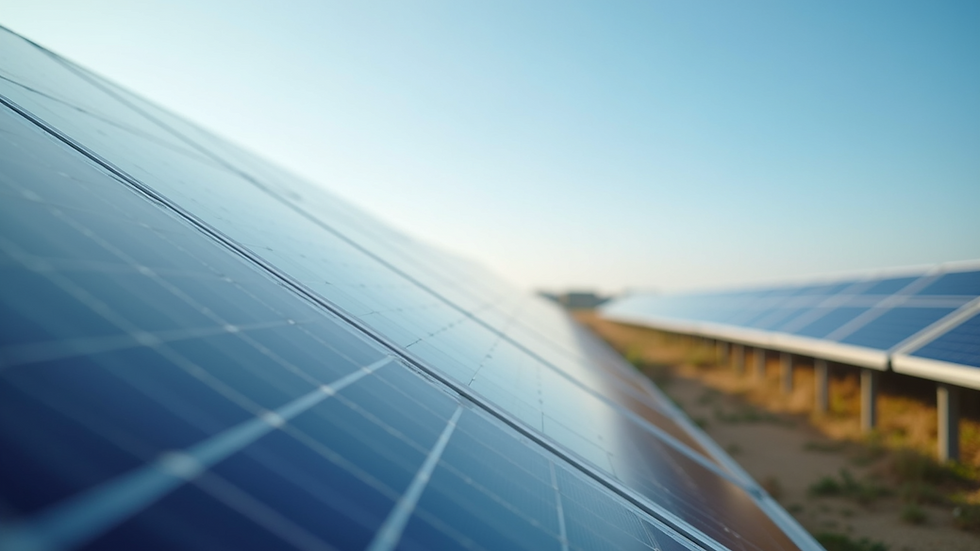Maximizing Efficiency with Residential Solar Solutions
- Riverstone Electric

- Aug 21, 2025
- 4 min read
Solar energy has become a popular choice for homeowners looking to reduce their electricity bills and minimize their environmental impact. With advances in technology and decreasing costs, residential solar systems are more accessible than ever. However, to truly benefit from solar power, it is essential to maximize the efficiency of your solar setup. This article explores practical ways to enhance the performance of solar systems in residential settings, helping you get the most out of your investment.
Understanding How Solar Systems Work
Solar systems convert sunlight into electricity using photovoltaic (PV) panels. These panels are made of semiconductor materials that generate direct current (DC) electricity when exposed to sunlight. An inverter then converts this DC electricity into alternating current (AC), which powers your home.
To maximize efficiency, it is important to understand the factors that affect solar panel performance:
Sunlight exposure: Panels need direct sunlight to generate maximum power.
Panel orientation and tilt: The angle and direction of panels influence how much sunlight they capture.
Shading: Trees, buildings, or other obstructions can reduce sunlight and lower output.
Temperature: High temperatures can decrease panel efficiency.
Maintenance: Dirt, dust, and debris on panels can block sunlight.
By optimizing these factors, homeowners can significantly improve the energy output of their solar systems.

Key Strategies to Improve Solar Systems Efficiency
Improving the efficiency of your solar system involves both proper installation and ongoing maintenance. Here are some actionable recommendations:
Optimal Panel Placement
Panels should face true south (in the northern hemisphere) to capture the most sunlight throughout the day. The tilt angle should be adjusted based on your latitude to maximize exposure during different seasons.
Avoid Shading
Even partial shading on one panel can reduce the output of the entire system. Trim nearby trees and avoid placing panels near chimneys or other structures that cast shadows.
Use High-Quality Components
Invest in high-efficiency solar panels and inverters. Modern panels can convert more sunlight into electricity, and efficient inverters reduce energy loss during conversion.
Regular Cleaning and Inspection
Clean panels periodically to remove dust, bird droppings, and leaves. Inspect wiring and mounting hardware to ensure everything is secure and functioning properly.
Energy Storage Solutions
Pairing solar panels with battery storage allows you to store excess energy generated during the day for use at night or during cloudy periods, increasing overall system efficiency.
Monitor System Performance
Use monitoring software to track energy production and detect issues early. Many systems offer apps that provide real-time data and alerts.
By following these steps, homeowners can ensure their solar systems operate at peak efficiency, reducing reliance on the grid and lowering energy costs.

What is the biggest downside to solar electricity?
While solar electricity offers many benefits, it also has some drawbacks that homeowners should consider:
Intermittency: Solar power depends on sunlight, so energy production drops at night and during cloudy weather. Without adequate storage, this can limit reliability.
Initial Cost: The upfront investment for solar panels, inverters, and installation can be significant, although prices have dropped considerably in recent years.
Space Requirements: Solar panels require sufficient roof or ground space, which may not be available for all homes.
Maintenance Needs: While generally low, solar systems do require occasional cleaning and inspections to maintain efficiency.
Energy Storage Costs: Batteries add to the overall cost and require replacement after several years.
Despite these challenges, many homeowners find that the long-term savings and environmental benefits outweigh the downsides. Careful planning and system design can mitigate many of these issues.

Financial and Environmental Benefits of Residential Solar Systems
Investing in solar energy offers both economic and ecological advantages:
Reduced Electricity Bills: Solar panels generate free electricity, lowering monthly utility costs.
Increased Home Value: Homes with solar installations often sell for more due to energy savings.
Government Incentives: Many regions offer tax credits, rebates, or grants to offset installation costs.
Lower Carbon Footprint: Solar energy produces no greenhouse gas emissions during operation, helping combat climate change.
Energy Independence: Solar systems reduce reliance on fossil fuels and the electrical grid.
To maximize these benefits, consider consulting with a professional installer who can tailor a system to your home’s specific needs. For example, residential solar systems can be customized to optimize energy production based on your location and energy consumption patterns.
Tips for Choosing the Right Solar System for Your Home
Selecting the right solar system involves several considerations:
Assess Your Energy Needs: Review your electricity bills to determine average consumption and peak usage times.
Evaluate Your Roof: Check the condition, orientation, and shading of your roof to ensure it can support solar panels.
Compare System Types: Decide between grid-tied, off-grid, or hybrid systems based on your energy goals.
Check Installer Credentials: Choose certified and experienced installers with good customer reviews.
Understand Warranties and Maintenance: Look for products with strong warranties and inquire about maintenance services.
By carefully evaluating these factors, you can select a solar system that delivers maximum efficiency and value for your home.
Maximizing the efficiency of your solar system is key to enjoying the full benefits of solar energy. With proper installation, regular maintenance, and smart system choices, you can reduce your energy costs and contribute to a cleaner environment. Whether you are just starting to explore solar options or looking to upgrade an existing system, these strategies will help you get the most from your investment.




Comments